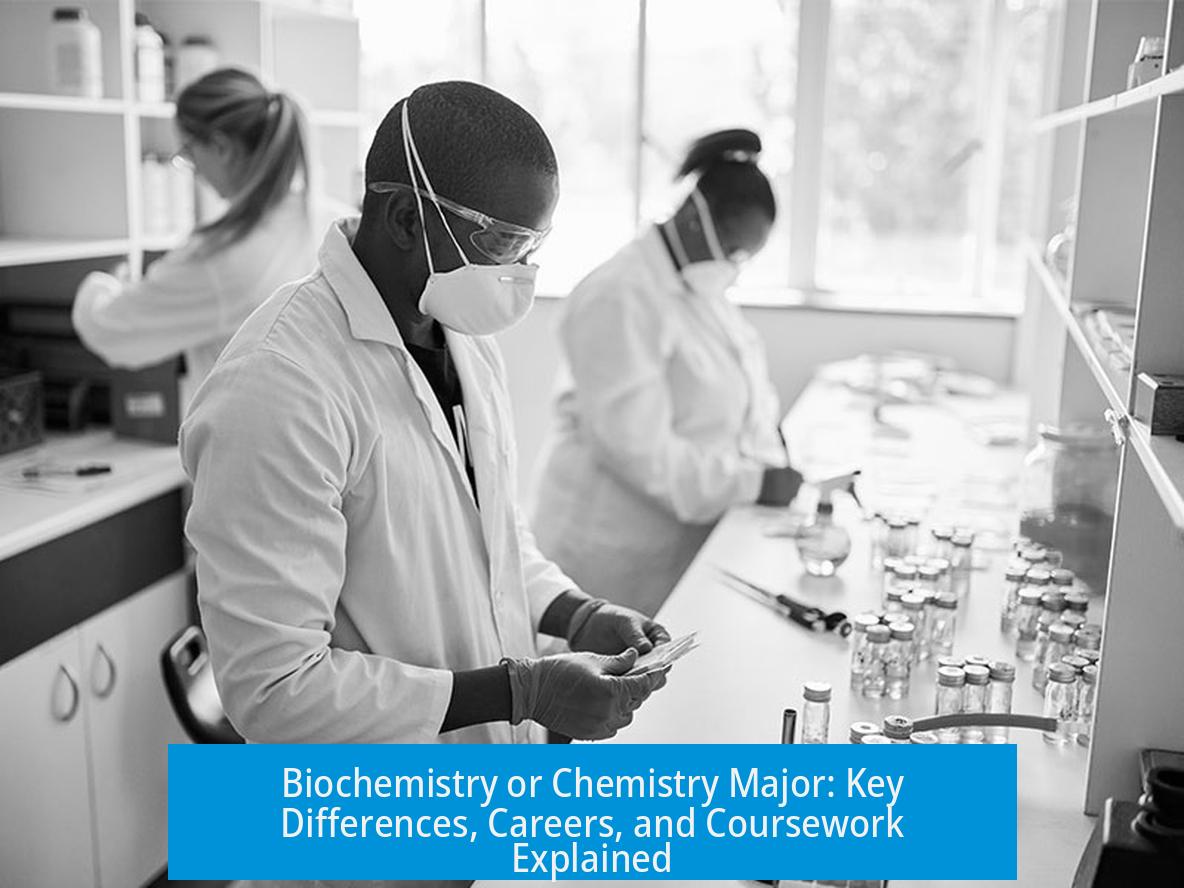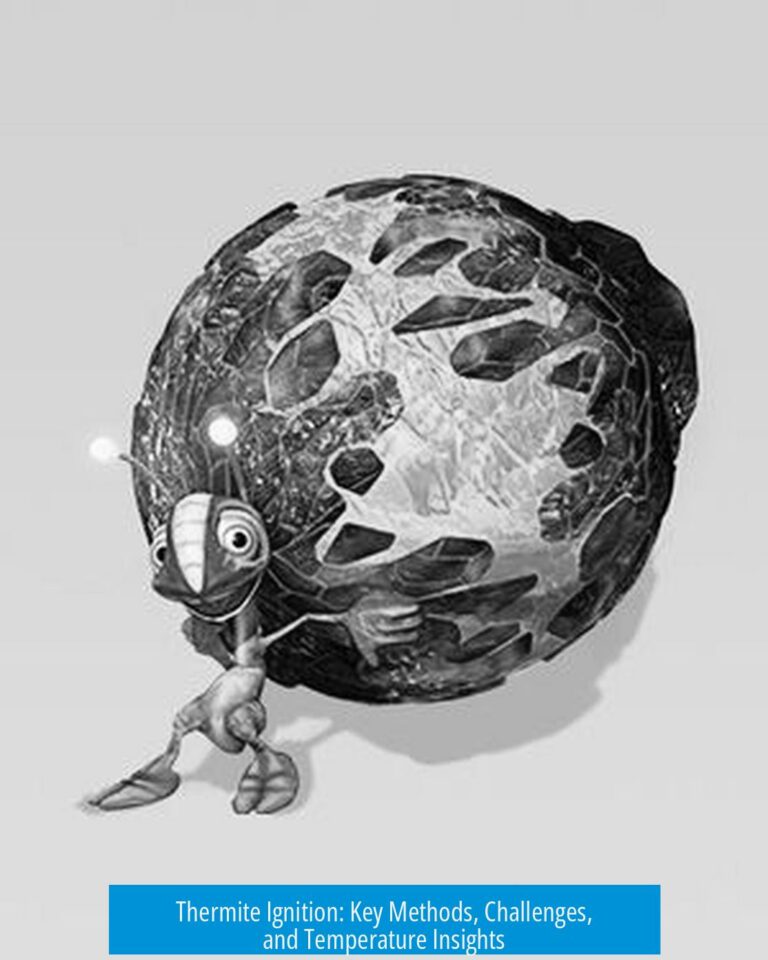Biochemistry or Chemistry Major?
Choosing between a biochemistry or chemistry major depends on your career goals, interests in biology or physical sciences, and willingness to engage with specific coursework. Biochemistry focuses on chemical processes in living systems and suits those pursuing medicine or biological sciences. Chemistry offers a broader and more rigorous training across multiple subdisciplines and requires more mathematics, making it ideal for physical, inorganic, or general chemical fields.
Definition and Focus of Each Major

Biochemistry
Biochemistry studies the chemistry within biological systems. It combines organic chemistry with molecular biology to explain life processes at a molecular level. It appeals to students interested in the intersection of chemistry and biology.
This major fits well for careers in medicine, pharmaceuticals, or biological research. If you want to work in medicine or biological sciences, biochemistry typically provides a more directed pathway.
However, biochemistry narrows career options more than chemistry because it emphasizes biological systems exclusively.
Chemistry
Chemistry is a broader science covering physical, organic, inorganic, analytical, and physical chemistry disciplines. It equips students with a wider array of scientific principles and techniques.
Chemistry majors gain a more mathematically rigorous education, including advanced calculus and physics. The major supports diverse career pathways including materials science, environmental chemistry, and pharmaceuticals.
Coursework and Academic Rigor
Shared Early Coursework

During the first one to two years, both majors share many foundational courses such as general chemistry and calculus. This overlap allows flexibility to switch majors early in the undergraduate program without losing progress.
Biochemistry Coursework
- Upper-level biochemistry classes and labs
- Molecular biology and genetics
- Analytical and physical chemistry classes but often fewer than chemistry majors
Chemistry Coursework
- Calculus through multivariable (Calc 3)
- Quantum mechanics and physical chemistry
- Calculus-based physics
- Inorganic, organic, and physical chemistry with rigorous lab work
Chemistry is often considered more demanding mathematically. Biochemistry classes integrate chemical concepts with biological context and can be conceptually challenging but less focused on theoretical math.
Class Selection Strategy
Students may take courses covering both disciplines before declaring the major. Choosing early can minimize courses that are unwelcome or unnecessary, avoiding overloaded schedules.
Career Prospects and Job Market
Employment Opportunities
Neither major guarantees immediate employment without further education. Bachelor’s degrees in chemistry or biochemistry usually lead to entry-level positions with modest pay.
Advanced degrees (master’s or Ph.D.) improve job prospects and open doors to research or specialized industry roles.
Industry Directions
- Biochemistry: Stronger fit for pharmaceuticals, biotechnology, medical research, and biology-oriented roles. Emphasis on biologics and drug development.
- Chemistry: Better for inorganic, physical, analytical chemistry, materials science, and environmental roles.
Biochemistry merges biology and chemistry skills, making it versatile for biomedical science jobs. Chemistry provides a fundamental backbone to many scientific and industrial careers beyond biology.
Job Searching Tips
Students should explore local job listings to understand available opportunities. Searching keywords like “chemist,” “biochemistry,” or “research” helps identify career targets. Tailoring upper-level courses toward desired jobs is advisable.
Graduate School and Further Education
Graduate education plays a crucial role in advancing careers with either major. Chemistry majors with some biochemistry coursework can transition smoothly into biochemistry graduate programs. Conversely, biochemistry majors often continue into medical, pharmaceutical, or advanced biological research degrees.
Students must consider whether they plan to pursue graduate studies before choosing a major. This decision heavily impacts both curriculum choice and future career options.
Department Culture and Academic Environment
Department culture differs between institutions and can influence your academic experience. Some chemistry departments may have intense competition or traditional environments. Chemistry departments sometimes exhibit more old-fashioned academic cultures.
Networking, internships, and mentorship within departments increase chances for better career outcomes. Internships or family connections in the field can be critical for employment after graduation.
Interdisciplinary Nature and Flexibility
The boundaries between biochemistry and chemistry are not rigid. Many schools offer interdisciplinary options, such as chemistry majors with a biochemistry emphasis. Chemistry students can take extra biology courses to broaden their expertise.
This flexibility lets students customize their education to fit interests and career goals while receiving a solid grounding in chemistry.
Personal Considerations and Recommendations
- Assess your passion: If chemistry fascinates you broadly, major in chemistry.
- Consider difficulty: Chemistry tends to demand more math and physics knowledge.
- Look at career aspirations: Medicine or biological sciences lean towards biochemistry.
- Review curricular plans: Study four or five-year major plans to compare courses.
- Understand job market realities: A bachelor’s degree in either major often leads to further education.
- Make informed choices early to balance workload and interest.
Summary of Differences and Similarities
| Aspect | Biochemistry | Chemistry |
|---|---|---|
| Main Focus | Chemistry in biological systems | Broad chemical principles including inorganic, organic, physical chemistry |
| Typical Careers | Medicine, pharmaceuticals, biomedicine, biotechnology | Materials science, environmental chemistry, physical chemistry, research |
| Mathematics & Physics | Moderate math, some physical chemistry | Higher math and physics intensity |
| Coursework Overlap | Shared early curriculum with chemistry, more biology focus later | Shared early curriculum, broader chemistry courses afterward |
| Graduate School | Focus on biomedical/biological sciences graduate programs | Options across various chemistry subdisciplines and biochem |
| Job Market | Biology/medicine-oriented roles, may require grad school | More variety but often requires advanced education |
Key Takeaways
- Biochemistry is best if interested in medicine or biological sciences with a chemistry lens.
- Chemistry offers broader scientific training with greater mathematical rigor.
- Initial coursework overlaps, allowing switching majors early.
- Bachelor’s degrees in either major usually need further education for well-paying jobs.
- Graduate school prospects and career goals should guide major choice.
- Department culture and internships affect academic experience and job prospects.
- Students should research local job markets and course options carefully before deciding.
What are the main differences in focus between biochemistry and chemistry majors?
Biochemistry studies chemical processes within living systems. Chemistry covers a broader range, including inorganic, organic, and physical chemistry. If you want to work in medicine or biology, biochemistry fits better. For a wider chemistry scope, choose chemistry.
Is it harder to switch between biochemistry and chemistry majors early on?
The first year or two have similar classes in both. Switching majors early is manageable. It depends on course requirements and how specialized upper-level classes are, but initially, you can explore both fields before deciding.
Which major offers better job prospects right after graduation?
Both majors face challenges finding chemistry-related jobs straight out of undergrad. Biochemistry may offer more biology-related opportunities, especially in pharma. Still, many students pursue graduate school to improve marketability in either field.
How does graduate school factor into the decision between these two majors?
Chemistry provides a solid foundation for biochemistry graduate studies. Taking biochemistry classes as a chemistry major can strengthen your background. Your grad school goals should influence which major you pick.
Can I combine elements of both majors during my studies?
Yes. Many programs allow you to take biochemistry courses as a chemistry major or choose a chemistry major with a biochemistry option. The disciplines overlap, so you can tailor your education to your interests.





Leave a Comment